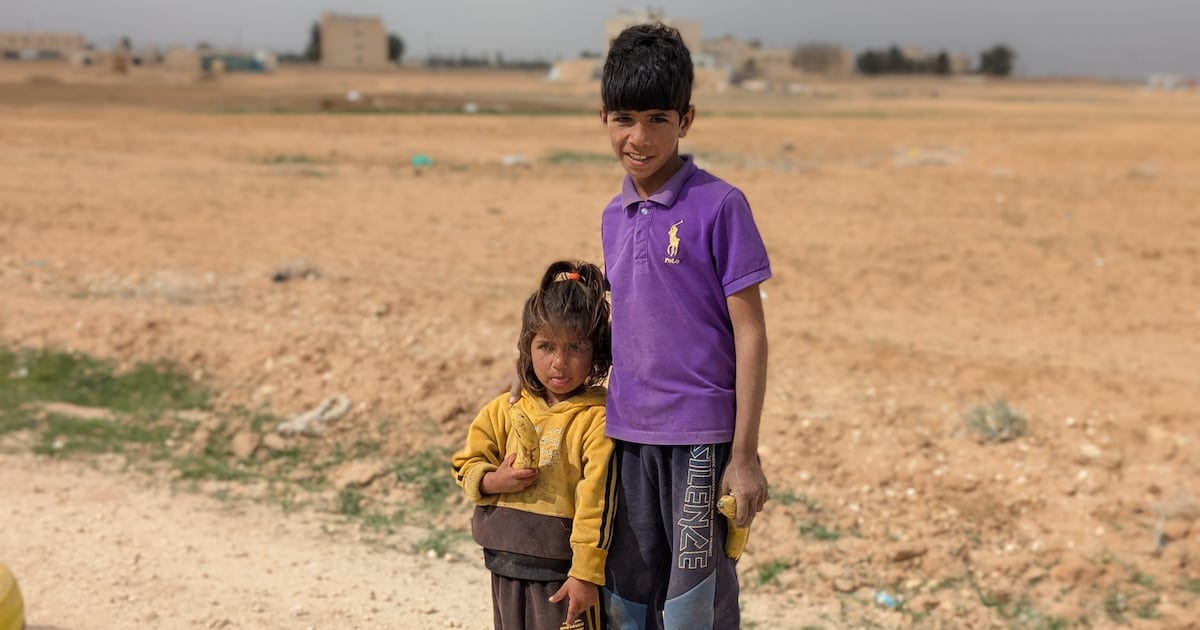28 Aug 2025, 8:00 a.m. MDT
In a modest one-room school near Zarqa, Jordan, children displaced by war gather each day to learn, play and receive nourishment. Most of their families fled Syria more than a decade ago with little more than the clothes on their backs.
Today, in the Mafraq camp, they find not only a classroom but also hope — thanks to a collaboration between The Church of Jesus Christ of Latter-day Saints Zarqa Baptist Church reported the Church’s Middle East Newsroom.
Since 2011, more than 14 million Syrians have been forced to flee their home.
A school for children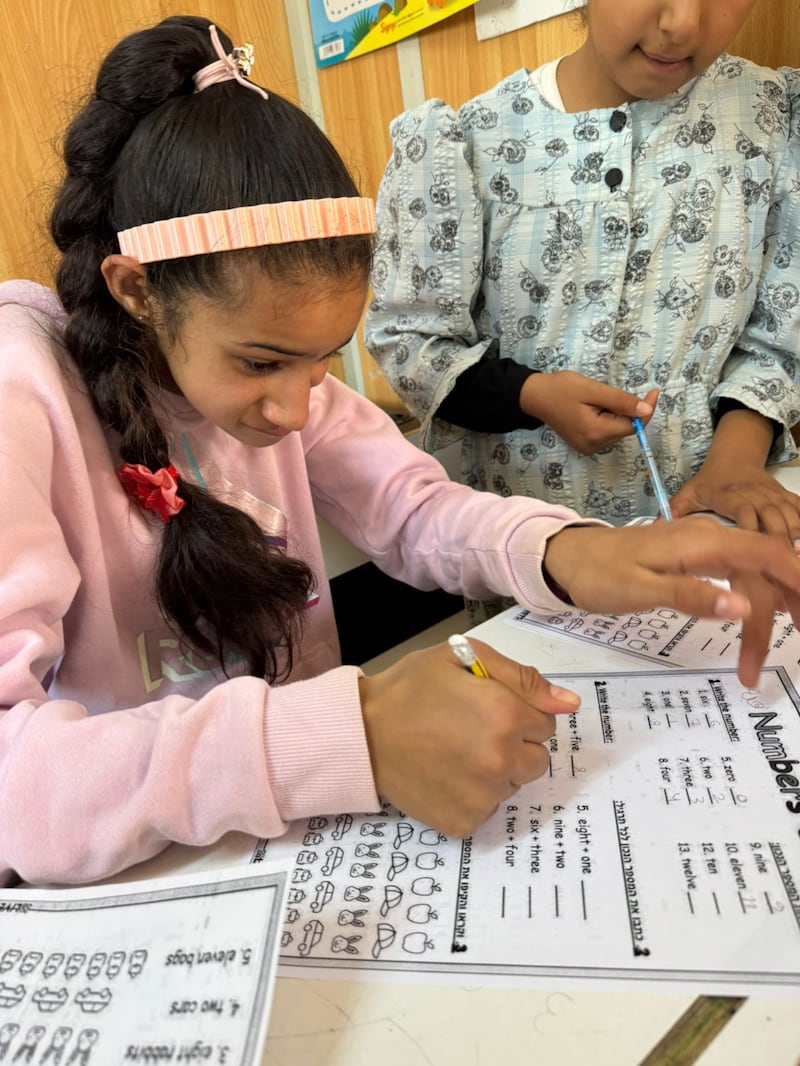 A girl at the Mafraq Camp near Zarqa, Jordan, completes a worksheet learning numbers in 2025. | The Church of Jesus Christ of Latter-day Saints
A girl at the Mafraq Camp near Zarqa, Jordan, completes a worksheet learning numbers in 2025. | The Church of Jesus Christ of Latter-day Saints
Constructed with support from the Church and operated by Zarqa Baptist Church, the school addresses three vital needs for refugee children: education, nutrition and health.
“Without this remedial education program, these children would never have the opportunity to learn to read or write, nor would they receive any form of schooling,” explained Andrew Majdi of Zarqa Baptist Church.
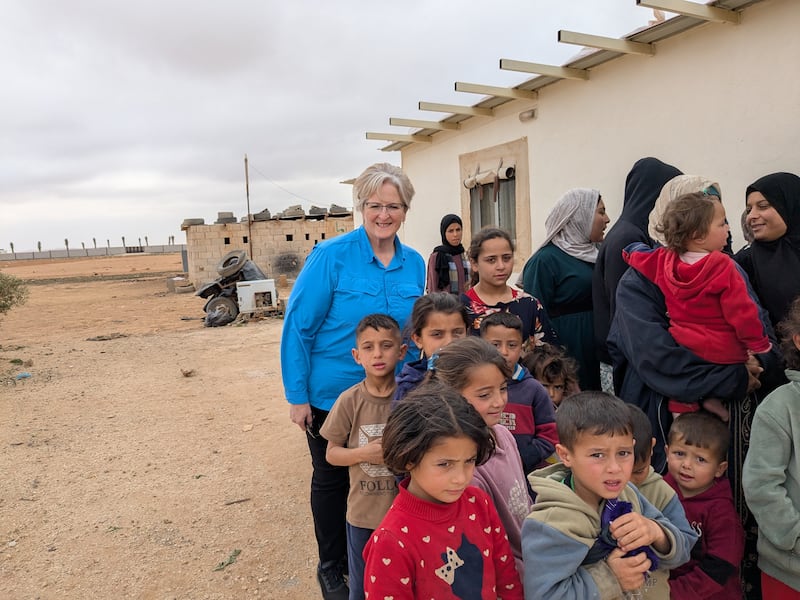 Wendy Housari joins children and mothers outside of the Church-donated school in the Mafraq refugee camp near Zarqa, Jordan, in March 2025. | Provided by Wendy Housari
Wendy Housari joins children and mothers outside of the Church-donated school in the Mafraq refugee camp near Zarqa, Jordan, in March 2025. | Provided by Wendy Housari
Each weekday, children ages 3 to 14 crowd into the classroom, where older students learn reading and math while younger children color or practice letters. The lessons are basic, but for many, it is their first chance at formal schooling. Staff at the local Baptist church prepare simple but nourishing lunches — labneh, cheese sandwiches, juice, fruit or an occasional pizza — funded by both faiths.
“It melts my heart to see these young students who don’t have anything, not a playground or even a safe place to play,” said Wendy Housari, a senior service volunteer for the Church. “But they do have a school where they can get an education and a healthy meal.”
Humanitarian work throughout Jordan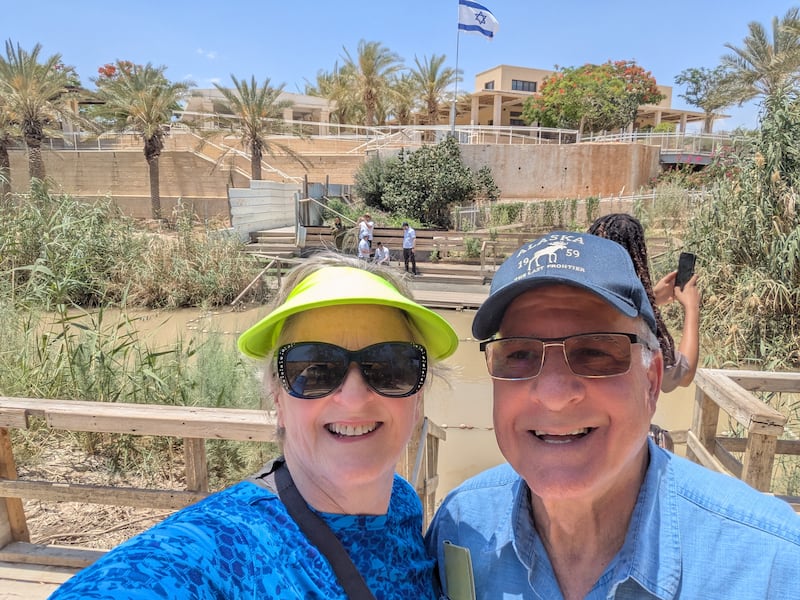 Wendy and Rizek Housari, Church service volunteers, visit the Jordan River in May 2025. | Provided by Wendy Housari
Wendy and Rizek Housari, Church service volunteers, visit the Jordan River in May 2025. | Provided by Wendy Housari
Wendy Housari and her husband, Rizek Housari, have been working as senior service volunteers in Jordan for nine months. Unlike missionaries, they wear no formal clothing, don’t proselyte and use no formal titles.
“We are the only service humanitarian volunteers in the country of Jordan,” Wendy Housari said. “We reside in the capital, Amman, but we cover the entire country.”
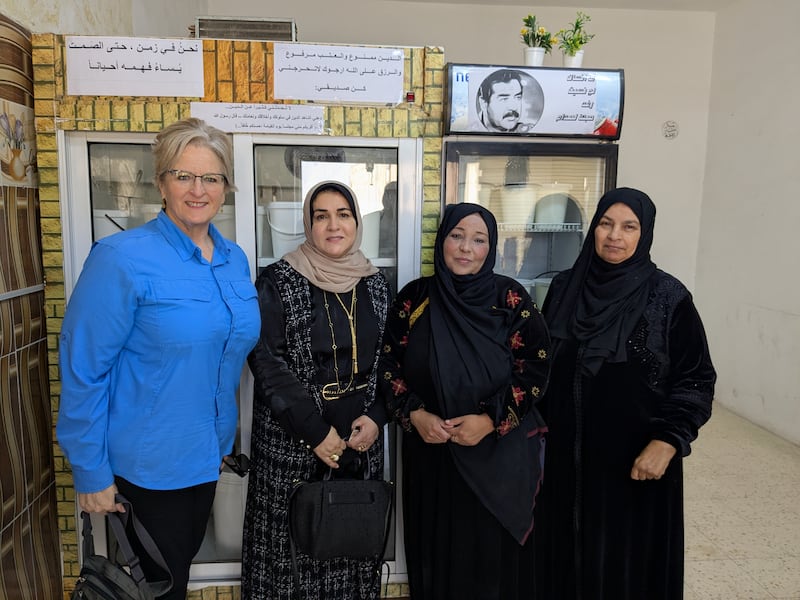 Wendy Housari poses for a photo with women who received training and supplies from the Church to be able to sell yogurt and goat cheese in April 2025. | Provided by Wendy Housari
Wendy Housari poses for a photo with women who received training and supplies from the Church to be able to sell yogurt and goat cheese in April 2025. | Provided by Wendy Housari
Their days are filled with varied service: one morning taking someone to the doctor, another day visiting schools or refugee camps to evaluate needs. “We go out to organizations interested in receiving Church funds,” Wendy Housari explained.
The clinic in a classroom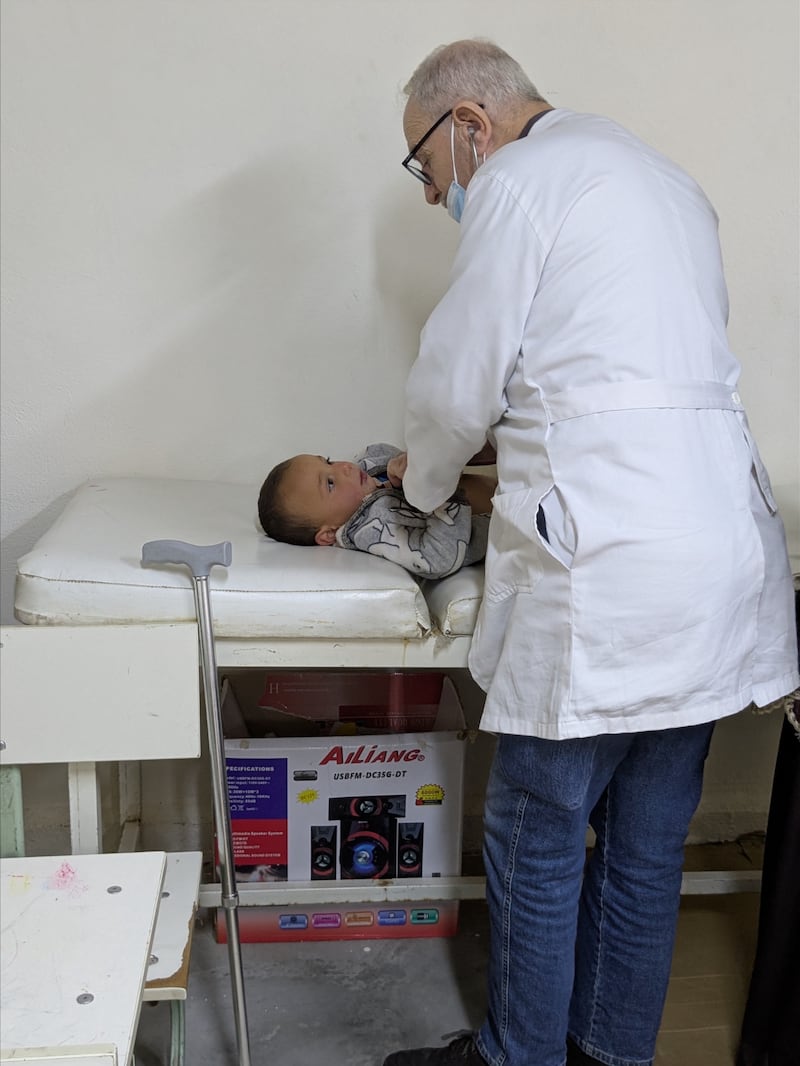 Refugee families receive care from the doctors at a monthly health clinic in the Mafraq settlement near Zarqa, Jordan, in 2025. | The Church of Jesus Christ of Latter-day Saints
Refugee families receive care from the doctors at a monthly health clinic in the Mafraq settlement near Zarqa, Jordan, in 2025. | The Church of Jesus Christ of Latter-day Saints
Once a month, the Mafraq school transforms into a medical clinic. Families line up early in the morning for a chance to see volunteer doctors who treat between 120 and 140 patients each visit. The clinic provides essential care for conditions such as diabetes and high blood pressure, along with vitamins for children.
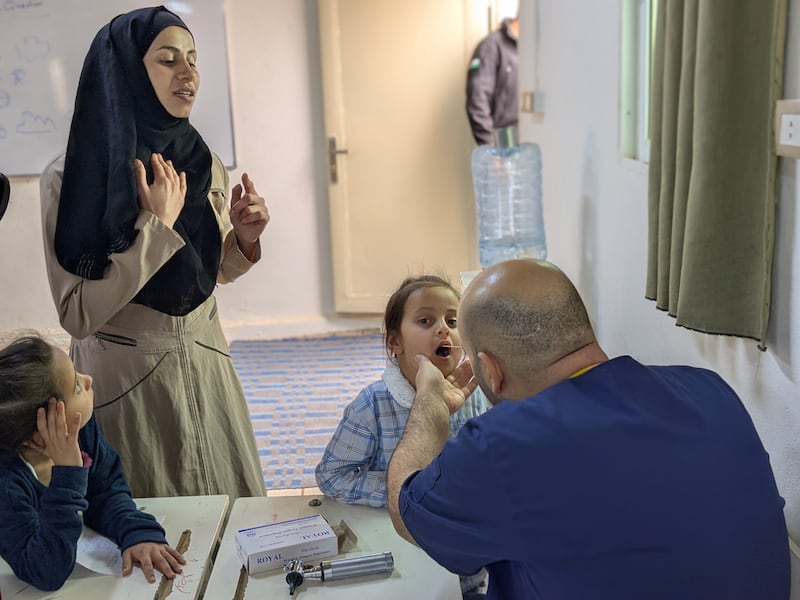 Refugee families gather for free medical treatment offered by Zarqa Baptist Church and The Church of Jesus Christ of Latter-day Saints near Zarqa, Jordan. | The Church of Jesus Christ of Latter-day Saints
Refugee families gather for free medical treatment offered by Zarqa Baptist Church and The Church of Jesus Christ of Latter-day Saints near Zarqa, Jordan. | The Church of Jesus Christ of Latter-day Saints
“The medical services provided to refugee families in the camp are incredibly important,” Majdi explained. “We’ve discovered many serious cases, like heart conditions and diabetes, that require urgent, costly care. Thanks to this mobile clinic, lives have been saved and many more have been improved.”
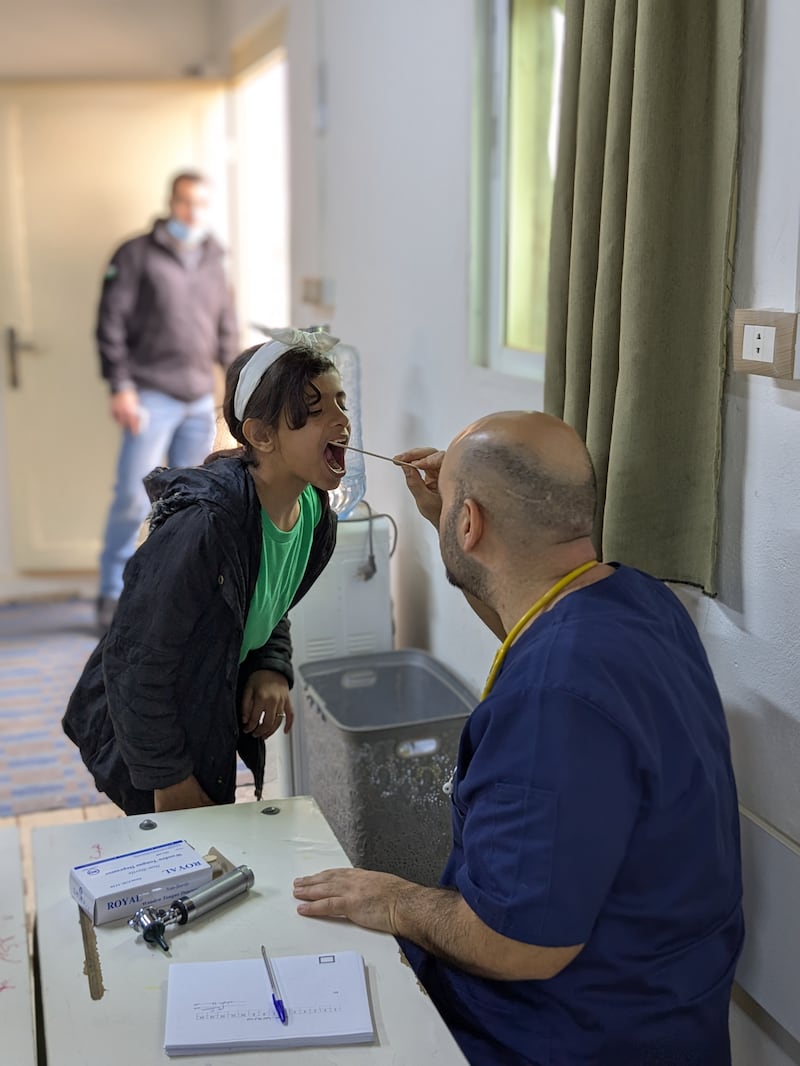 Refugee families receive care from the doctors at a monthly health clinic in the Mafraq settlement near Zarqa, Jordan, in 2025. | The Church of Jesus Christ of Latter-day Saints
Refugee families receive care from the doctors at a monthly health clinic in the Mafraq settlement near Zarqa, Jordan, in 2025. | The Church of Jesus Christ of Latter-day Saints
The Church covers the cost of all medications, while Zarqa Baptist Church provides staff and transportation to serve those of other faiths. “Probably 99.9% of those patients are Muslim,” Wendy Housari noted.
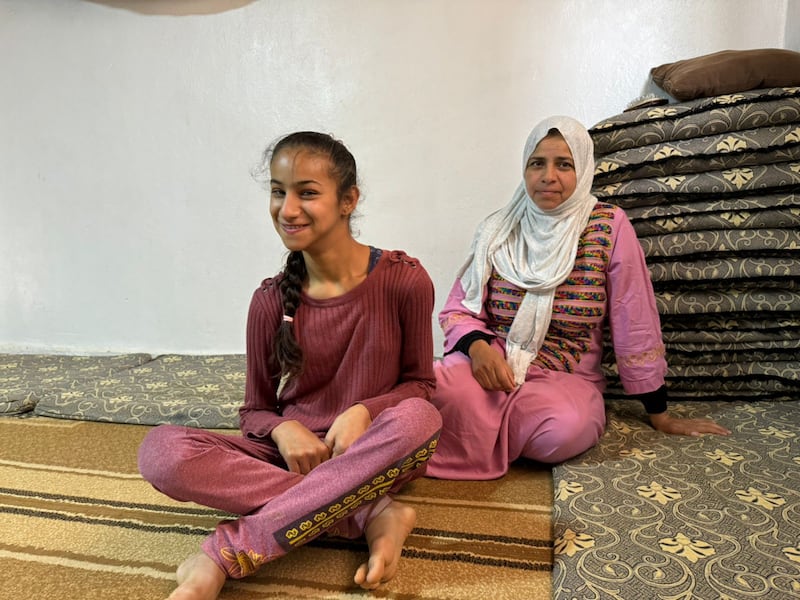 Hamda Al-Aql sits behind her daughter at the Mafraq camp refugee settlement near Zarqa, Jordan, in 2025. | The Church of Jesus Christ of Latter-day Saints
Hamda Al-Aql sits behind her daughter at the Mafraq camp refugee settlement near Zarqa, Jordan, in 2025. | The Church of Jesus Christ of Latter-day Saints
One mother, Hamda Al-Aql, expressed her gratitude: “The center has never failed us. Every month they provide all the medications we need — not just monthly prescriptions but also help with urgent needs. They supported my daughter not just in school but through major knee surgery. After years of suffering, she was able to walk again, thanks to their follow-up and support.”
Impressions from the camps
The needs are immense. When the Housaris first visited the camp in the winter, Wendy Housari was shocked at “how destitute it is,” she said, noting: “these little children who don’t have any socks on, and just how cold it was. And when the heater goes on, the lights go off.”
As a former teacher, Wendy Housari hopes that they can help create a successful future for the children. “I’m glad they’re learning and they’re getting some type of education.”
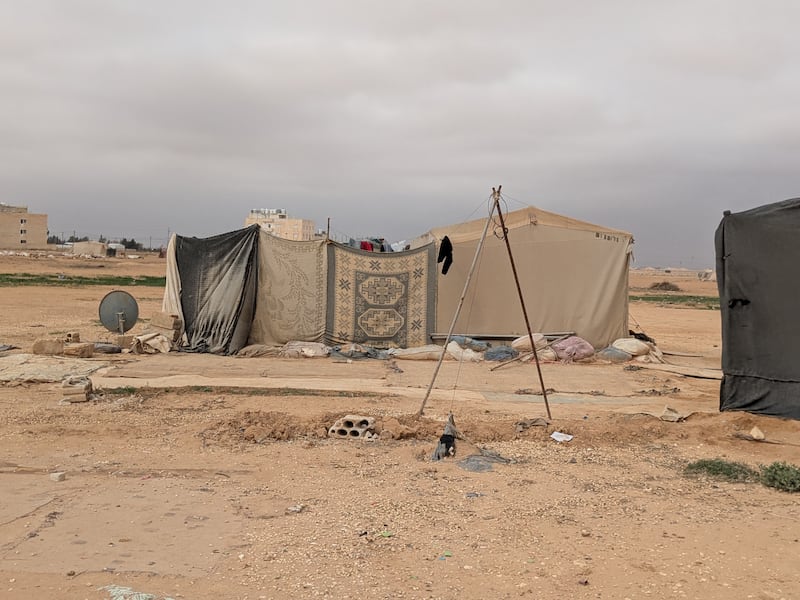 One of the tents that refugees live in in the Mafraq refugee camp near Zarqa, Jordan, in 2025. | The Church of Jesus Christ of Latter-day Saints
One of the tents that refugees live in in the Mafraq refugee camp near Zarqa, Jordan, in 2025. | The Church of Jesus Christ of Latter-day Saints
Even while seeing difficult situations, the Housaris encounter kindness. A leader of the Mafraq camp invited them into his tent to “offer hospitality,” Rizek Housari said. “They made us herbal tea when we told them we don’t drink coffee.”
Serving as volunteers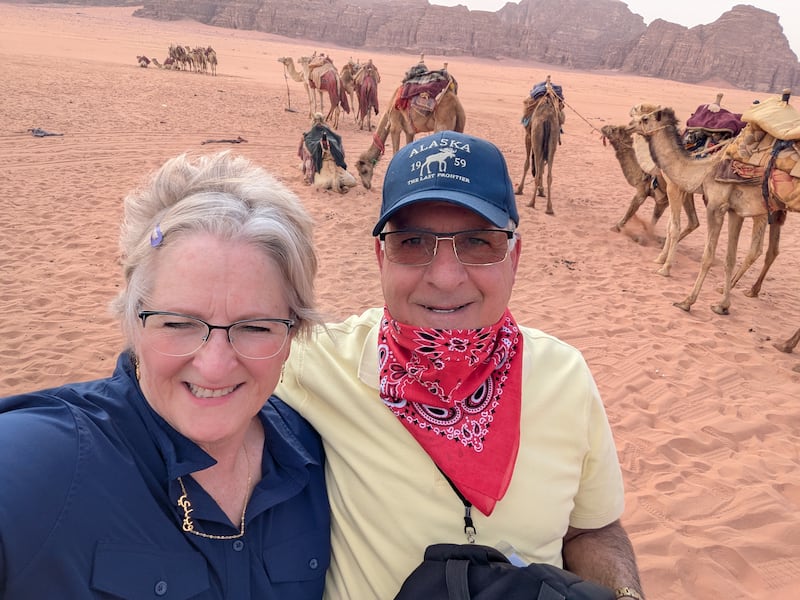 Wendy and Rizek Housari pose for a photo in the Wadi Rum valley in Jordan in April 2025. | Provided by Wendy Housari
Wendy and Rizek Housari pose for a photo in the Wadi Rum valley in Jordan in April 2025. | Provided by Wendy Housari
Some people ask why the Housaris are in Jordan.
“People ask us, ‘Why are you doing this?” Rizek Housari said, adding that they ask, “Are you trying to convert them to Christianity?’”
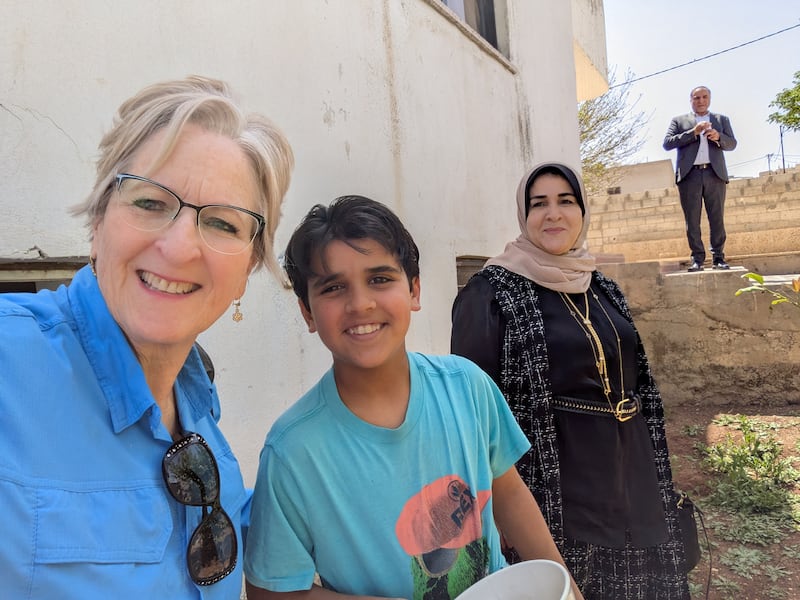 Wendy Housari takes a selfie with a family that received chickens and incubators from Latter-day Saint Charities in Jordan in April 2025. | Provided by Wendy Housari
Wendy Housari takes a selfie with a family that received chickens and incubators from Latter-day Saint Charities in Jordan in April 2025. | Provided by Wendy Housari
Wendy and Rizek Housari don’t proselyte though. “We just let them know that this charitable organization is part of the Church of Jesus Christ, and so we do things in common. We follow the teachings of Jesus Christ, where He said, ‘If we love God, we have to love our fellow man, regardless of their religion or ethnicity.’”
They see themselves as representing the Church to Jordanians. “We represent 18 million members who donate these funds,” Rizek Housari explained.
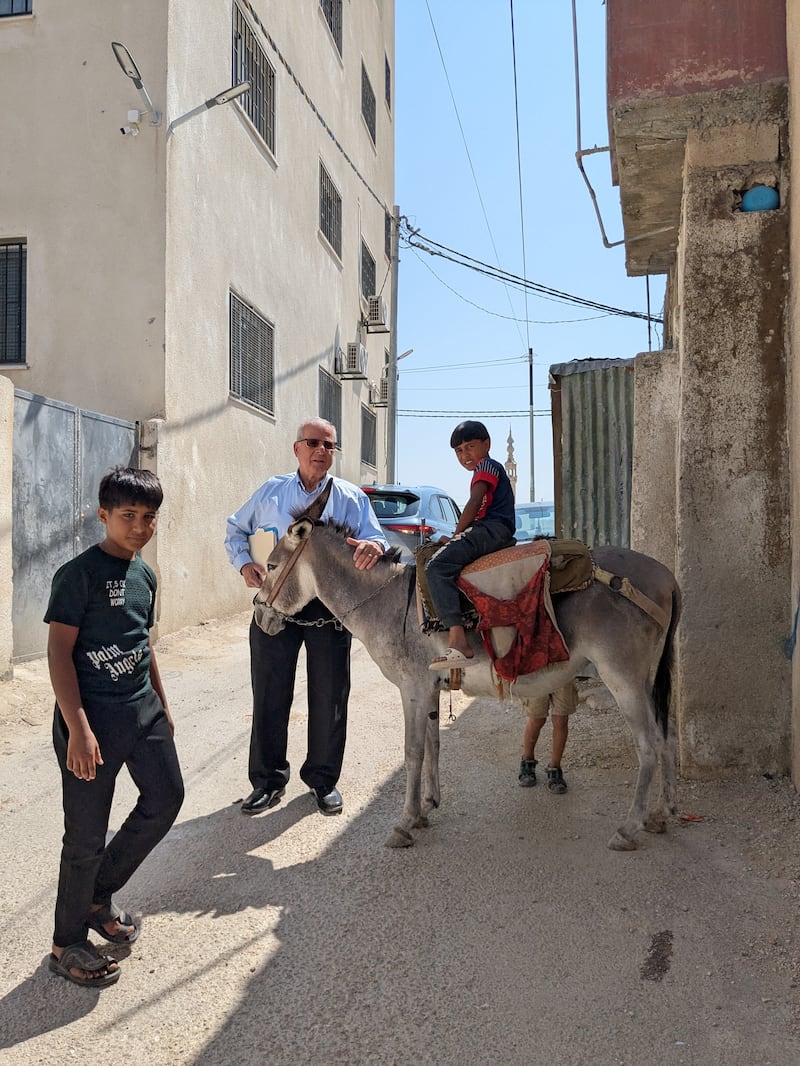 Rizek Housari poses for a photo with young men outside of a refugee camp in Jordan in June 2025. | Provided by Wendy Housari
Rizek Housari poses for a photo with young men outside of a refugee camp in Jordan in June 2025. | Provided by Wendy Housari
For the Housaris, service is not about titles or clothing. Even though they don’t wear name tags, “We have His name in our hearts,” Wendy Housari said. “More important than the tag is carrying His name in our countenance as we meet people.”
Wendy Housari reflected on an October 2022 general conference talk by Elder Ronald A. Rasband inviting senior individuals to volunteer.
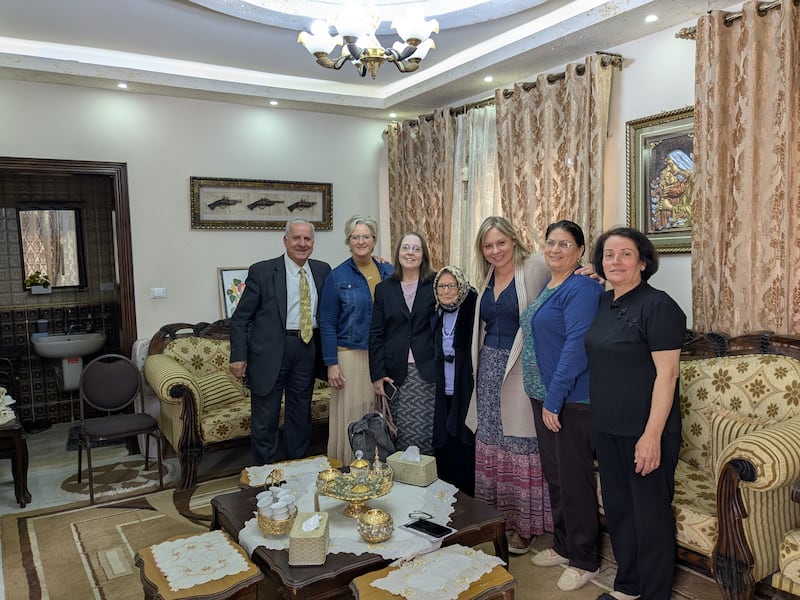 Rizek and Wendy Housari, far left, pose for a photo with women after Relief Society in May 2025. Rizek Housari translates Arabic for individuals who attend Relief Society. | Provided by Wendy Housari
Rizek and Wendy Housari, far left, pose for a photo with women after Relief Society in May 2025. Rizek Housari translates Arabic for individuals who attend Relief Society. | Provided by Wendy Housari
“After hearing Elder Rasband’s talk, we realized that we needed to go now. So I went ahead and didn’t sign another [teaching] contract for the following year, and we knew the Lord would bless us,” she said, adding: “It was just a little push that we needed … we don’t regret it at all.”
The kindness of Jordanians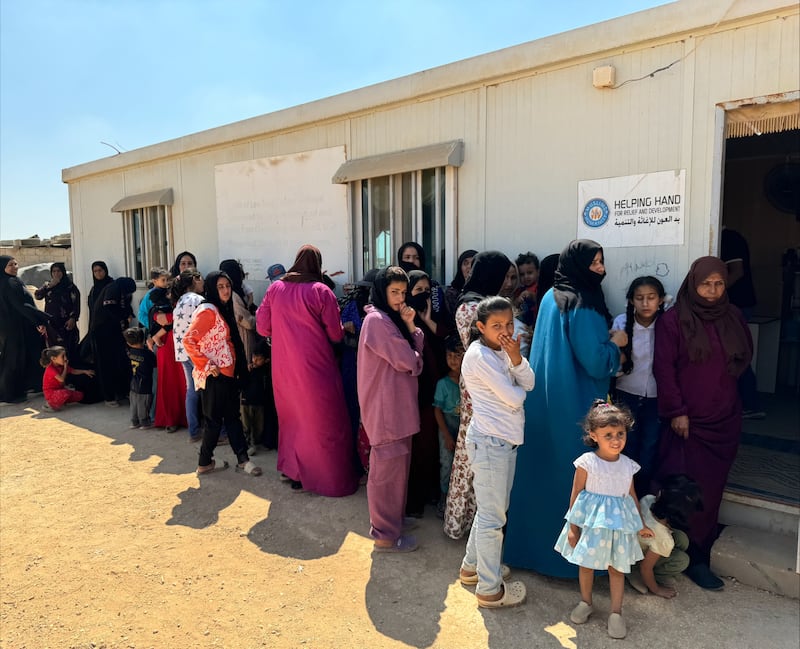 Refugee families gather for free medical treatment offered by Zarqa Baptist Church and The Church of Jesus Christ of Latter-day Saints near Zarqa, Jordan. | The Church of Jesus Christ of Latter-day Saints
Refugee families gather for free medical treatment offered by Zarqa Baptist Church and The Church of Jesus Christ of Latter-day Saints near Zarqa, Jordan. | The Church of Jesus Christ of Latter-day Saints
In their service, the Housaris have also been blessed by the generosity of Jordan’s people. “Jordan is surrounded by conflict and turmoil, yet its people are kind and welcoming,” Wendy Housari said. “One man we had just met paid for our meal before leaving. Strangers invite us into their homes. It’s a beautiful and safe country. People are friendly and respectful.”
She added, “They’ve made us feel at home.”
Faiths united in service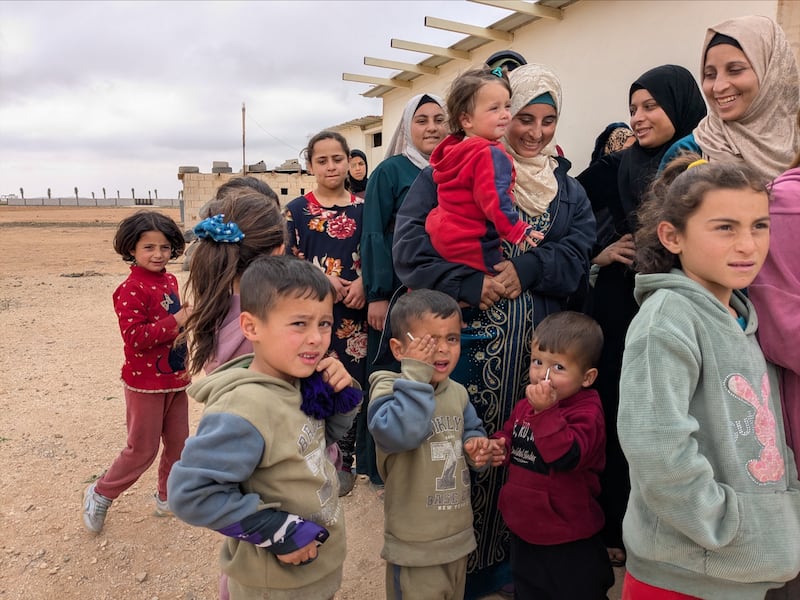 Refugee families gather for free medical treatment offered by Zarqa Baptist Church and The Church of Jesus Christ of Latter-day Saints near Zarqa, Jordan. | The Church of Jesus Christ of Latter-day Saints
Refugee families gather for free medical treatment offered by Zarqa Baptist Church and The Church of Jesus Christ of Latter-day Saints near Zarqa, Jordan. | The Church of Jesus Christ of Latter-day Saints
The collaboration between The Church of Jesus Christ of Latter-day Saints and Zarqa Baptist Church continues to grow. Together, the two organizations operate permanent and mobile clinics, feed children, support education and bring relief to families who otherwise would have none.
“We feel proud and grateful for our collaboration with Latter-day Saint Charities,” Majdi said. “Our work together has enabled us to serve a large number of people in need.”
